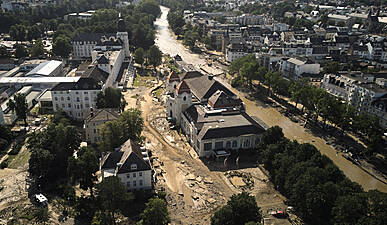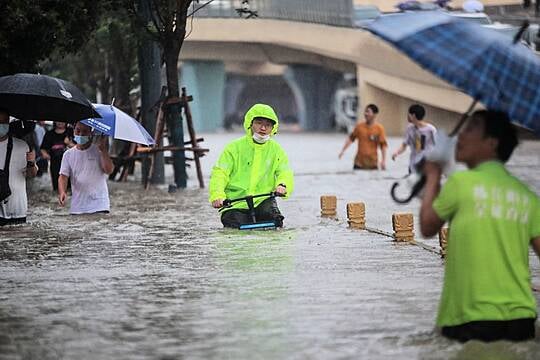A dozen people died in a flooded subway line in Zhengzhou, the capital of China's central Henan province, after the city was drenched by what weather watchers said were the heaviest rains for 1,000 years.
Video posted on social media late on Tuesday showed commuters chest-deep in murky floodwaters on a train in the dark, and an underground station turned into a large, churning pool. More 500 people were pulled to safety from the subway flood, Zhengshou city authorities said.
"The water reached my chest," one survivor wrote on social media. "I was really scared, but the most terrifying thing was not the water, but the diminishing air supply in the carriage."
Due to the rain, authorities in the city of 12 million people about 650 km southwest of Beijing, had halted bus services, said a Zhengzhou resident surnamed Guo, who spent the night at his office.
"That's why many people took the subway, and the tragedy happened," Guo told Reuters.
Amid torrential rains since last weekend, the death toll rose to at least 16 on Wednesday with four residents of Gongyi reported dead, according to local media. The city - located by the banks of the Yellow River, like Zhengzhou - has suffered widespread collapse of homes and structures due to the rains.
More rain forecast
More rain is forecast across Henan for the next three days, and the People's Liberation Army has dispatched more than 3,000 soldiers and personnel to help with search and rescue.
From Saturday to Tuesday, 617.1 millimetres (mm) of rain fell in Zhengzhou. That's almost equal to Zhengzhou's annual average of 640.8 mm.
The rainfall in Zhengzhou over the three days was on a level seen only "once in a thousand years", local meteorologists said.
Like recent heatwaves in the United States and Canada and extreme flooding seen in western Europe, the rainfall in China was almost certainly linked to global warming, scientists told Reuters.
"The common thread here is clearly global warming," said Johnny Chan, a professor of atmospheric science at City University of Hong Kong.
"Such extreme weather events will likely become more frequent in the future. What is needed is for governments (city, provincial and national) to develop strategies to adapt to such changes."
Flood prevention difficult
Across Henan, a major logistics hub with a population of around 100 million, many train services have been suspended. Highways have also been closed and flights delayed or cancelled.
A train from Zhengzhou had barely left city limits on Monday before it stopped, stranding hundreds of passengers. As of Wednesday, water and food supplies on the train have run out, according to local media.
Roads in a dozen Henan cities were severely flooded.
"Flood prevention efforts have become very difficult," President Xi Jinping said on Wednesday, addressing the situation in a statement broadcast by state television.
Dozens of reservoirs and dams also breached warning levels.
Local authorities said the rainfall had caused a 20-metre breach in the Yihetan dam in Luoyang city west of Zhengzhou, and that the dam "could collapse at any time".
In Zhengzhou, Guojiazui reservoir had been breached, but there was no dam failure yet.
About 100,000 people in Zhengzhou have been evacuated.
A raft of Chinese companies, insurers and a state-backed bank said they had offered donations and emergency aid to local governments in Henan amounting to 1.935 billion yuan (€255 million).
Schools and hospitals cut off
Taiwan's Foxconn, which operates a Zhengzhou plant that assembles iPhones for Apple, said there was no direct impact on its facility.
SAIC Motor, China's largest automaker, said logistics at its Zhengzhou plant would see some short-term impact, while Japan's Nissan said production at its factory had been suspended.
Zhengzhou's transportation system remained paralysed, with schools and hospitals cut off by waterlogging.
We've up to 200 people of all ages seeking temporary shelter
Residents caught in the flood had taken shelter in libraries, cinemas and even museums.
"We've up to 200 people of all ages seeking temporary shelter," said a staffer surnamed Wang at the Zhengzhou Science and Technology Museum.

"We've provided them with instant noodles and hot water. They spent the night in a huge meeting room."
About 3 km away, the First Affiliated Hospital of Zhengzhou University - the city's largest with over 7,000 beds - has lost all power. Even backup supplies were down.
The hospital was racing to find transport to relocate about 600 critically ill patients.
Meanwhile, Hebei province, which shares a border with Henan, issued a storm alert for some cities, including its capital Shijiazhuang, with moderate to heavy rain expected from Wednesday. - Reuters







